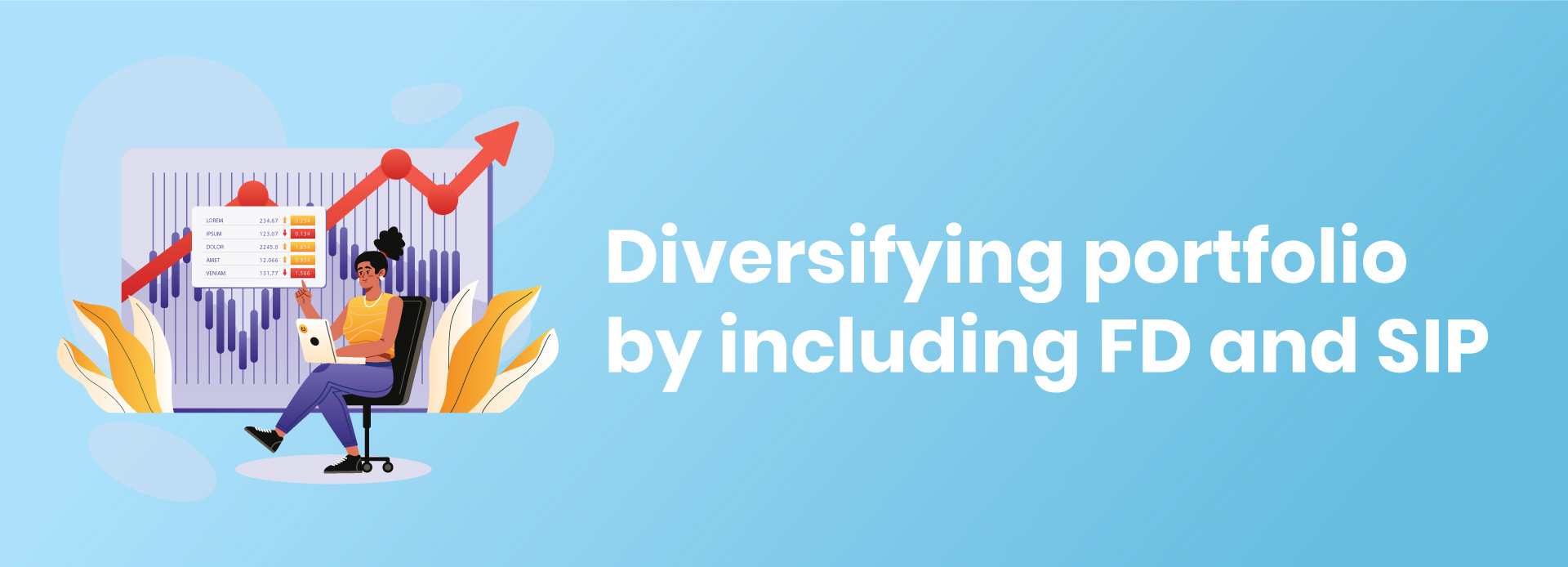
Diversify Your Portfolio: The Power of SIP and FD
27 June 2024 | By INDIE
In the ever-evolving world of finance, building a strong and balanced portfolio is key to achieving your financial goals. Two popular investment options, Fixed Deposit (FDs) and Systematic Investment Plans (SIPs), offer distinct advantages. Have you often wondered which is better, FD or SIP? Understanding their strengths and weaknesses can empower you to create a diversified portfolio that fosters long-term wealth creation.
The Safety Net: Fixed Deposits (FDs)
Fixed Deposits, offered by banks and NBFCs (Non-Banking Financial Companies), are a low-risk investment option. You deposit a lump sum for a predetermined tenure, earning a guaranteed interest rate throughout the period. Here's what makes FDs attractive:
1. Guaranteed Returns: FDs offer a fixed interest rate, providing predictable returns on your investment, unlike market-linked investments.
2. Low Risk: FDs are considered a safe investment with minimal risk of losing your principal amount.
3. Ease To Liquidate: Some banks offer high liquidity on your FDs, allowing you to access your funds before maturity at a cost.
4. Tax Benefits: There is a tax on FD interest based on your income tax slab. However, interest earned on certain types of FDs like Tax Saver FDs (under Section 80C of The Income Tax Act, 1961) is eligible for tax benefits.
The Growth Engine: Systematic Investment Plans (SIPs)
SIPs are a route to invest in mutual funds. You invest a fixed amount at regular intervals (monthly, quarterly) over a chosen time frame. Here's how SIPs can help you grow your wealth:
1. Conquer Market Volatility: SIPs leverage rupee-cost averaging, allowing you to purchase mutual fund units at various price points. This helps average out the cost per unit and potentially weakens the impact of market fluctuations.
2. Compounding Magic: With SIPs, your returns are reinvested alongside your regular contributions. Over time, this compounding effect significantly boosts your overall corpus (total investment value).
3. Start Small, Dream Big: SIPs allow you to begin with a manageable amount that fits your budget, unlike any lump sum investments. Even small, consistent contributions can accumulate significantly over the long term.
4. Flexibility is Key: SIPs offer the ability to adjust your investment amount (increase or decrease) or even pause contributions temporarily to adapt to your changing financial needs.
5. Long-Term Approach: SIPs are best suited for long-term financial goals (5+ years). Staying invested longer allows you to ride out market ups and downs and benefit from compounding.
Making the Right Choice: SIP vs FD
The ideal choice between SIP vs FD depends on your individual financial goals, risk tolerance, and investment horizon. Here's a breakdown to help you decide:
Invest in FDs if:
● You prioritize capital preservation and seek guaranteed returns.
● You have a short-term financial goal and need easy access to your funds.
● You are a risk-averse investor with a low appetite for market fluctuations.
Invest in SIPs if:
● You have a long-term investment horizon (5 years or more) and can handle market volatility.
● You aim for wealth creation and potentially higher returns than FDs.
● You want to inculcate a habit of disciplined investing and benefit from rupee-cost averaging.
Also Read: Why a Fixed Deposit is a good investment?
The Power of Diversification
The true magic lies in combining these investment options and diversifying your portfolio with both FDs and SIPs to provide a balanced approach to managing risk and maximizing returns and help create a well-rounded portfolio. It manages risk and potentially maximizes returns by having assets that react differently to market fluctuations.
Building a strong portfolio is about finding the right balance between risk and return. Between SIP and fixed deposit, you need to understand that each has its risks and benefits. SIPs and FD, when used strategically, can be powerful tools in your financial journey. By understanding their strengths and incorporating them into a diversified portfolio, you can navigate the investment landscape with confidence and achieve your financial goals. Create a personalized investment plan aligned with your unique needs and risk tolerance.
Disclaimer: The information provided in this article is generic and for informational purposes only. It is not a substitute for specific advice in your circumstances. Hence, you are advised to consult your financial advisor before making any financial decision. IndusInd Bank Limited (IBL) does not influence the views of the author in any way. IBL and the author shall not be responsible for any direct/indirect loss or liability incurred by the reader for making any financial decisions based on the contents and information.




